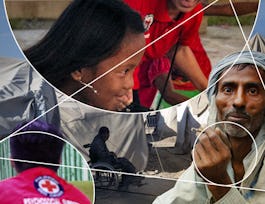Welcome to the Global Health and Humanitarianism MOOC. We are delighted to have you with us, and hope that the next six weeks will provide an interesting and thoughtful experience for you.
We hope the course will give you an overview of global health and humanitarianism in theory and in practice. These fields overlap, and are connected, in many significant ways. However, we have used three key themes to explore our subjects: each key theme will be discussed over two week blocks by specialist course lecturers, and supported by unique video perspectives by three keynote speakers who are leading specialists in the field. - Weeks 1 & 2: An Introduction to Global Health Dr Amy Hughes MBE; - Weeks 3 & 4: Humanitarian Responses and Dilemmas Dr Tim Jacoby; - Weeks 5 & 6: The Right to Humanitarian Assistance and the Responsibility to Protect Dr Kirsten Howarth. To get the best out of the course we encourage you to try and set aside a few hours each week. This will give you time to work through videos, written materials and linked resources, and to get involved with discussion with other learners. We have provided a variety of different readings, resources and suggested activity based on the course content. Some will be essential to your understanding of the MOOC themes, and to assessment (if you have chosen to take part in assessment activity). Others will be for those of you who want to discover more about a particular subject or perspective, or to make your own study of global health or humanitarianism in action. Check through the weekly resources and content to find out which best suit your needs. During the course we will look at a range of different opinions and debates, linked to key themes and addressing ethics and moral issues. We hope you will be inspired and encouraged to explore and share your own perspectives, and those of others, throughout the course. Different viewpoints are essential to understanding global health and humanitarian practice. We hope you enjoy the next six weeks finding out about Global Health and Humanitarianism, and look forward to hearing from you on the discussion boards.



















